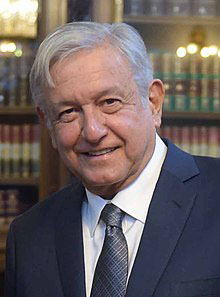 It’s no coincidence that Venezuelan dictator Nicolás Maduro shouted “¡Viva Mexico!” during his inauguration for a second six-year term on Thursday: Mexico was one of the few Western democracies that sent a representative to the ceremony, which was boycotted by United States, the 28-country European Union and most Latin American countries.
It’s no coincidence that Venezuelan dictator Nicolás Maduro shouted “¡Viva Mexico!” during his inauguration for a second six-year term on Thursday: Mexico was one of the few Western democracies that sent a representative to the ceremony, which was boycotted by United States, the 28-country European Union and most Latin American countries.
Mexico’s new leftist president, Andrés Manuel López Obrador, breaking with his country’s nearly two-decade-old policy of active diplomatic support for democracy and human rights around the world, argued that he’s just following a constitutional mandate not to interfere in other countries’ internal affairs.
That’s nonsense or, at best, a misleading interpretation of Mexico’s Constitution. Article 89 calls on the president to follow both a foreign policy of “non-intervention” in other countries’ affairs and to conduct a foreign policy guided by “the respect, protection and promotion of human rights.”
By failing to raise his voice against the Maduro regime’s repression that left more than 150 dead last year or Maduro’s fraudulent re-election in 2018 that helped send millions of Venezuelans into exile, López Obrador is not only failing to comply with inter-American conventions, he may be violating Mexico’s Constitution, too.
Furthermore, Mexico’s old “non-intervention” policy — known as the Estrada Doctrine, after the foreign minister, Genaro Estrada, who drafted it in the early 20th century — is a myth. The country’s nationalist populist presidents whom López Obrador most admires routinely violated it.
Late Mexican President Lazaro Cardenas openly supported the Republican side in the 1936-1939 Spanish Civil War and severed ties with dictator Francisco Franco. Former Mexican Presidents Luis Echeverría and Jóse López Portillo openly took sides with the victims of dictatorships in Chile and Nicaragua and broke ties with the two countries’ regimes in 1974 and 1979, respectively.
López Obrador himself called on other countries to condemn Mexico’s 2006 elections, which he narrowly lost — and which were freer and much more transparent than last year’s elections in Venezuela.
By siding with Venezuela, Cuba, Bolivia and Nicaragua — what’s left of Latin America’s Jurassic left — López Obrador is isolating himself from the rest of Latin America, and from key U.S. allies.
The 34-country Organization of American States passed a resolution on Thursday declaring Maduro an “illegitimate” president. Mexico was the only major Latin American democracy to abstain.
López Obrador is also alienating important allies in the U.S. Congress. New Jersey’s Sen. Bob Menendez, the ranking Democrat on the Senate Foreign Relations Committee, told me that he is “unhappy” with López Obrador’s new policy of breaking ranks with the rest of the region’s democracies on Venezuela.
Menendez, who is Cuban American, is just the kind of ally López Obrador badly needs in Congress to help contain President’s Trump’s anti-Mexico demagoguery.
So why is the Mexican president giving political oxygen to Maduro and his allies in Cuba, Bolivia and Nicaragua?
After interviewing him several years ago, my impression is that López Obrador still has little knowledge — or interest — in foreign affairs. He is a provincial politician. He may sympathize with leftist dictators, but has not been a frequent flyer to their countries.
Some critics say that López Obrador is embracing the “non-intervention” myth because he wants to stay in power indefinitely and will use that line to reject foreign criticism.
Most likely, López Obrador’s wink to Venezuela is an effort to please his left-wing followers. His Morena Party president, Yeidckol Polevnsky, is an enthusiastic supporter of the dictatorships in Venezuela and Cuba, as are many Morena legislators in the Mexican Congress.
But López Obrador — and Mexico — will pay a political price for tacitly supporting Maduro. Mexico is losing respect among Western democracies — and key allies in the United States — where that country most needs them.








